Share
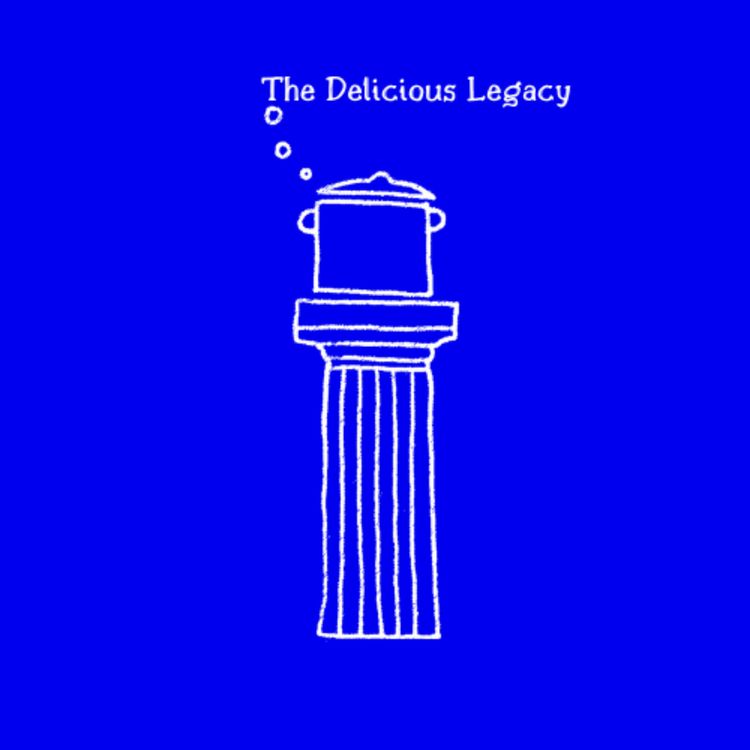
The Delicious Legacy
The Audacious Gourmand Archestratus
History's first ever gourmand, foodie, hipster of the Ancient Greco-Roman world!
The question of Archestratus life story had me puzzled for ages! I wanted to write an episode for a while now, but the more I looked for information about his life and works the more unanswered questions I have had! Admittedly, countless classicists, historians and food writers have been puzzled through the ages too, with the same burning questions.
Imagine the worst foodie hipster (I zest here, I am one!) friend you have; The one that visits the local farmers market every weekend, goes to Borough Market as if on a religious pilgrimage at least once a month and also on top of that knows every single Vietnamese store in Hackney or the South-American food stall in Seven Sisters Indoor market. He also seem to know the food trends, the new ingredients and read the reviews on Eater for the cheapest eats at the outskirts of South-East London for some reason! (as if he or she will ever visit south east!)
Well your friend doesn't compare to Archestratus little finger! If you thought your friend was bad for visiting the mercado de san martin in San Sebastian, mercado San Miguel in Madrid and La Boqueria market in Barcelona, mercato delle embre in Bologna, Grand Bazaar in Istanbul or Varvakios Market in Athens spending hours looking at fish that cannot buy...you know the friend who watched all the episodes of Anthony Bourdain's "Parts Unknown" and can quote all his lines...Well, our dude Archestratus, was a lot worst!
New tastes, the freshest ingredients, so local and seasonal and simple, that even the inhabitants of the nearest town wouldn't have heard them, well he would have been there first, straight to the local fishermen begging them for a fish. Well this is Archestratus! The tourist who went to every food market on every city he visited; only he accomplished your feat 2500 years ago and all by sail!
In the interconnected world of the ancient Mediteranean we then find Archestratus, a Sicilian who circumnavigated the world to satisfy his hunger - and even lower appetites, as a Roman scholar said once quite disparagingly. He was though an inveterate traveller. How else could he have found out about the specialities of all these places, small seaside cities over 50 of them from Sicily to the Black Sea? Remarkably what he writes rings true, as sometimes their specialities are exactly the same now as they were 2400 years ago. Archestratus loved the taste of Lesbian wine but also praised the aroma of the Phoenician wine that came from Byblos. (Although he though it to go off quickly)
"When a libation to the gods you make,
Let your wine worthy be, and ripe and old;
Whose hoary locks droop o'er his purple lake,
Such as in Lesbos' sea-girt isle is sold.
Phœnicia doth a generous liquor bear,
But still the Lesbian I would rather quaff;
For though through age the former rich appear,
You'll find its fragrance will with use go off."
We know almost nothing about him, apart that he was a Sicilian Greek from Gela (or Syracuse) and that he wrote a now lost, remarkable and unique poem "The Life of Luxury" (Hydipatheia). The poem is dated variously around 350BCE.
What we know of the poem, is mostly from Athenaus from his work "Deipnosophistai" -Philosophers at Dinner- which was composed in about AD200. This, is our only source for Archestratus work, which is telling. Lost works of ancient literature - poetry, drama etc- are usually reference by multiple ancient authors; however this lack of interest demonstrates the status of food and recipe books. Not high literature and therefore not carefully preserved for posterity.
What would I give for the chance to glance upon the book on bread-making by Chrysippus of Tyana or the book on salt fish by Euthydemus of Athens! Sadly both are lost completely and only know of their existence through second -hand passing accounts from other authors! Lost masterpieces!
Archestratus cooks the fish simply, boiling roasting or grilling with light seasoning and oil added if its quality fish. Freshness and quality are his watchwords and these features mustn't be damaged by strong sauces based on cheese and pungent herbs. His favourite fish tend to have firm-textured and strongly flavoured meat; rather than mild tasting flesh like the white fish we are now used in French cooking as the vehicle for sauces. He also shows much interest in eels; common, conger, mooray. He emphasizes flavour and the oil/fat of the fish, where the taste and interest is to be found. There is much interest in texture of the fish, the different cuts and parts, from head meat, fin, tail, belly as well as in the varieties of fish.
OK I will stop now and let the audio do the talking! Happy listening!
Links, sources, further reading:
Andrew Dalby, "Siren Feasts": https://books.google.co.uk/books/about/Siren_Feasts.html?id=wtLgAAAAMAAJ&redir_esc=y
Sally Grainger, Andew Dalby : "The Classical Cookbook" : https://books.google.co.uk/books/about/The_Classical_Cookbook.html?id=T7S5iC3pZp0C&redir_esc=y
Deipnosophistae https://en.wikipedia.org/wiki/Deipnosophistae
Ancient History Encyclopedia: https://member.ancient.eu/article/911/carthaginian-trade/
Athenaeus of Naucratis: https://en.wikipedia.org/wiki/Athenaeus
Support the podcast on Ko-Fi and Patreon for ad-free episodes!
More episodes
View all episodes
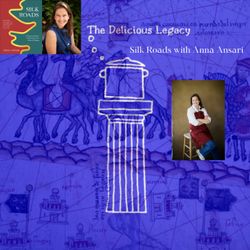
28. History of Food in Central Asia Pt1
47:17||Season 7, Ep. 28Melons. Spinach. Sheep tail fat.Spices. Bazaars. Enough tales to tantalise even the most incurious mind!Hello my curious archaeogastronomers!A new episode is here for your enjoyment!This time I have the great honour to have the fantastic Anna Ansari as my guest.We talk all about food, history and cultures of the cultures in Central Asia aka "Silk Roads" and her own personal story.I hope you'll enjoy this fantastic epic adventure!You can find Anna here on her website:https://www.annaansari.com/aboutAnd Instagram:https://www.instagram.com/thisplacetastesdelicious/?hl=enand buy her book here:https://www.waterstones.com/book/silk-roads/anna-ansari/9780241694374Lots of loveThom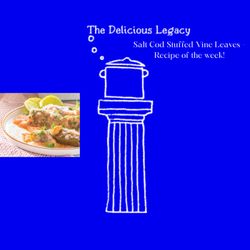
Cod Stuffed Vine Leaves: Recipe of the Week on Saturday
10:33|Hello!Today's recipe on a Saturday is Salt Cod Dolmades with tomatoey avgolemono (egg lemon) sauce:A Delicious Peloponnesian recipe for the winter times.In the interior of the Peloponnese, where fresh fish was rare dried fish such as cod became staple.Enjoy!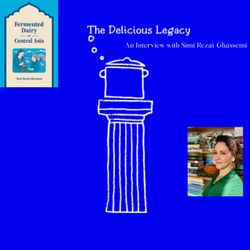
27. A History of Fermented Dairy in Central Asia - From the steppe to space!
01:02:00||Season 7, Ep. 27Hello my curious archaeogastronomers!A brand new episode is out, and it's all about the long history of fermented dairy foodstuffs from the vast regions of Central Asia.Fermented dairy products from Central Asia have been to space! Resilient and nutritious, and good for the bronze age and the space age, are truly interstellar travelers of our civilization! We all know yoghurt and kefir but have you heard of kumis, chortan, gooroot?For this reason I 've employed the expertise and knowledge of Dr Simi Rezai Ghassemi, to tell me all about the amazing, uknown, and life giving fermented dairy products of Central Asia countries, from Azerbaijan, to Iran, all the way to Mongolian steppe! The 4000 year old mummified remains of a woman known as "The Beauty of Xiaohe" have fermented dairy (kefir? cheese?) as necklace. A seemingly unbroken tradition of drying and preserving dairy for the long harsh environments of Central Asia since time immemorial...So who indeed invented the first kefir? This side of Caucasus or the desserts of China? All the above and much more on today's episode!More about the mummies found in Tarim Basin:https://www.penn.museum/sites/expedition/ancient-mummies-of-the-tarim-basin/Find out more about Dr Simi below:Web: https://simiskitchenblog.wordpress.comSubstack: https://srezaighassemi.substack.comIntagram: https://www.instagram.com/simiskitchen/Equinox: https://equinoxpub.com/projects/fermented-dairy-of-central-asiaAnyway enjoy our fascinating chat here!Love,Thom & The Delicious Legacy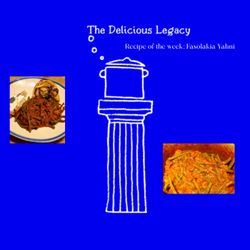
Sunday Recipe of the Week: Fasolakia Yahni (aka Greek Green Bean Stew)
07:55|Hello!New recipe of the week is out!This one is called "Fasolakia Yahni" and it's a classic of the "lathera" family of dishes, usually vegetarian. The name means "oily" aka cooked in lots of great Greek extra virgin olive oil! With music from Miltos Boumis.Enjoy!LoveThom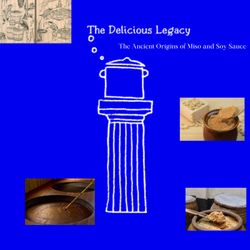
26. The Ancient Origins of Miso and Soy Sauce
57:43||Season 7, Ep. 26Hello!Brand new episode is out and I'm excited about it!World fermentation day was on February 1st, just three days ago.And what better way to celebrate with two amazing inventions of humankind?Is miso the most astounding transformation in the world of fermentation?From ancient Chinese meat and fish based pastes to Buddihst monks taking the craft to Japan the story of Miso and Soy Sauce has a long long at least three thousand year old history!Ok, enjoy today's episode!Some links:Excellent traditional soy sauce maker:https://kaneyoshi.co/english/Kioke Shoyu Brewers Revival Youtube channel:https://www.youtube.com/watch?v=K72eethJuU8&list=PLkakkeid1iaj55xr57PzNV-w7uKDLE-Eb&index=1https://kioke.jp/en4-brewersMy links/ recommendations for the week:Aubergines Braised With Trahana | My Greek Table with Diane Kochilas:https://www.youtube.com/watch?v=N5ni0hu7UDQGreek Farms | Apaki & Syglino: Taste Greece’s Tradition:https://www.youtube.com/watch?v=dinXaNT2LlMHow Extra-Virgin Olive Oil Is Made In Greece | Regional Eats | Food Insider:https://www.youtube.com/watch?v=l4GrYUUcQG0Sources:https://archive.org/details/bookofmisosavory0000shur_j6b4/page/20/mode/2uphttps://www.theguardian.com/world/2025/may/21/without-time-there-is-no-flavour-a-south-korean-grand-master-on-the-art-of-the-perfect-soy-sauceThe Noma Guide to Fermentation: Rene Redzepi & David ZilberEnjoy!Thom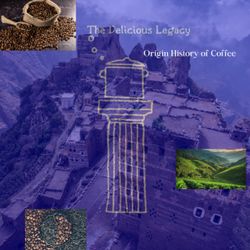
25. Origin History of Coffee (Reprise)
52:31||Season 7, Ep. 25Hello!What happened in Paris in 1669 that ushered the fashion of Coffee in France?What's the popular myth of the introduction of coffee in Europe and the cafe culture that has to do with the siege of Vienna?And how an Ethiopian goat herd named Kaldi is credited with the discovery of coffee?All this and more, exploring the long history of coffee and it's myths from the Cloud forests of Ethiopian highlands to the deserts of Arabia and beyond on this episode!Enjoy! Sources and Credits for this episode:Books:-A people's history of coffee and cafés by Biderman, Bob-The devil's cup : coffee, the driving force in history by Allen, Stewart Leehttps://insidearabia.com/coffee-the-lost-treasure-of-yemen/ And podcasts that deal with the subject in much more detail:A History of Coffee:https://www.spreaker.com/user/filterstories/episode-1-draft-8-ahoc-channelOriginal Music by Pavlos Kapralos & Miltos BoumisMotion Array Music:-UNCOVERING THE TRUTH A Rhian Talisein Sheehan Karl Solve Steven-Ashot Danielyan - Above The Long Desert- Arabia- Spirit of Oman-EMilarMusic&Audio_Shattered_StoneThat's it!Now go and listen to the episode!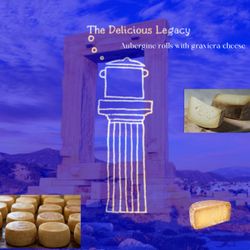
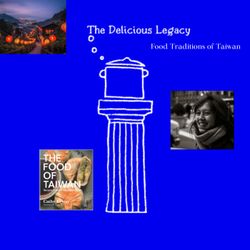
24. Food Traditions of Taiwan -Interview with Cathy Erway
54:25||Season 7, Ep. 24Hello my curious archaeogastronomers!New episode is out for your delight!An interview with food writer Cathy Erway about the foodways and dishes from the beautiful island of Taiwan!Recommendations for the week:The Library of Ancient Wisdom by Selena Wisnomhttps://www.penguin.co.uk/books/443027/the-library-of-ancient-wisdom-by-wisnom-selena/9780241519639The Ottoman History Podcast:https://www.ottomanhistorypodcast.com/The Hungry Historians podcast:https://open.spotify.com/show/2dd70WM8rXd2rMKepkbjwuEnjoy!LoveThom & The Delicious Legacy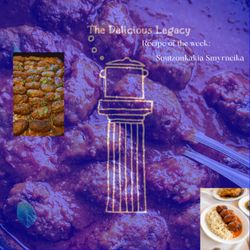
Soutzoukakia Smyrneika (Spicy meat balls from Smyrna)
13:16|Hello!Your recipe of the week on a Saturday is out! And what better dish than a Greek Sunday favourite?Izmir, Smyrni or Smyrna:One city, three names, a shared history of three thousand years! Being “born” in such a place, in the crossroads of trade, our recipe for “Soutzoukakia Smyrneika” or Izmir kofte encompasses spices valuable for trade and meat and ideas from East and West. And thus making a syncretic dish, delicious, luxurious and celebratory.Enjoy!Thom